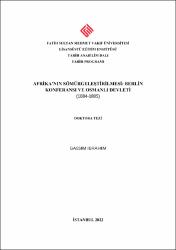Afrika’nın Sömürgeleştirilmesi: Berlin Konferansı ve Osmanlı Devleti (1884-1885)
Künye
IBRAHIM, Gassım, Afrika’nın Sömürgeleştirilmesi: Berlin Konferansı ve Osmanlı Devleti (1884-1885), Fatih Sultan Mehmet Vakıf Üniversitesi Lisansüstü Eğitim Enstitüsü Tarih Anabilim Dalı Tarih Programı, Yayımlanmamış Doktora Tezi, İstanbul 2022.Özet
Bu çalışmada Osmanlı Devleti’nin sömürgecilikle anılan Berlin Konferansı’na katılması, konferanstaki amaçları ve sonrasında Afrika’nın sömürgeleştirilmesinde kıtaya yönelik emelleri Avrupa devletleriyle mukayese edilerek ele alınmıştır. Bu bağlamda öncelikle Afrika’nın sömürgeleştirilmesine neden olan dış ve iç faktörler incelenmiş olup ardından 1880’li yıllarda Berlin Konferansı sürecine yol açan Kongo meselesinde ilgili devletlerin çıkarlarına odaklanmıştır. Kongo Havzası’nda çıkarları olmayan Osmanlı Devleti’nin ise düzenlenen Berlin Konferansı’na Avrupa devletlerinden farklı sebep ve gerekçelerle katıldığı anlaşılmıştır.
Osmanlı Devleti XIX. yüzyılın başından beri süren toprak kaybını önlemek ve gittikçe daralan imparatorluğun güvenliği ve Afrika’daki toprak bütünlüğünü korumak için konferansta temsil edilmeye karar vermiştir. Nitekim üç ay süren müzakerelerde Osmanlı temsilcisi sefir Said Paşa imparatorluk toprakları, devletin itibarı ve Müslümanların durumunu ilgilendiren kararlara çekincelerini ortaya koymuştur.
Keza konferans sonrasında da Avrupa devletleri sömürge imparatorlukları kurarken Osmanlı Devleti bekası için mücadele veriyordu. Bu dönemde Afrika’da başlayan toprak paylaşımı sırasında Osmanlı Devleti Yukarı Mısır bölgesi, Trablusgarp vilayeti ve hinterlant bölgesinin bütünlüğünü korumak için verdiği mücadelede Avrupa kabineleri nezdindeki diplomatik girişimlerden ziyade kıtanın müslüman önderlerine devlet memuru ve görevlileri göndererek tedbirler almaya çalışmıştır. Bununla birlikte bu devletlere nispeten kısıtlı imkânlara sahip olmasından dolayı verilen mücadele başarısızlıkla sonuçlanmıştır. This study discusses the participation of the Ottoman Empire and its objectives in the Berlin Conference, known as the colonialism conference, and then its ambitions for the continent in the colonization of Africa in comparison with European states. In this context, we examined first, the factors that gave rise to the 19th century’s colonialism, then focused on the interests of the states concerned with the Congolese question, which led to the process of the Berlin Conference in the 1880s. It emerges that the Ottoman Empire, which had no interest in the Congo Basin, participated in the Berlin Conference for different reasons than the European states.
The Ottoman state decided to be represented at the conference in order to protect its security and territorial integrity in Africa, and to prevent the loss of land that has been occurring since the beginning of the 19th century. Indeed, in the negotiations that lasted three months, the representative of the Empire at the conference, Said Pasha, expressed his reservations about the decision concerning Ottoman lands, the prestige of the State and the situation of Muslims in Africa.
Similarly, after the conference, as European states created new colonial empires, the Ottoman State struggled for survival. During the territorial division that began in Africa after the conference, the Ottoman Empire in addition to diplomatic initiatives with European cabinets, in the struggle to protect the integrity of Upper Egypt, the province of Tripoli and the hinterland region, attempted to take action by sending Ottoman officials to the mainland's Muslim leaders. However, this struggle failed due to the relatively limited means of the Empire compared to the colonial states.



















